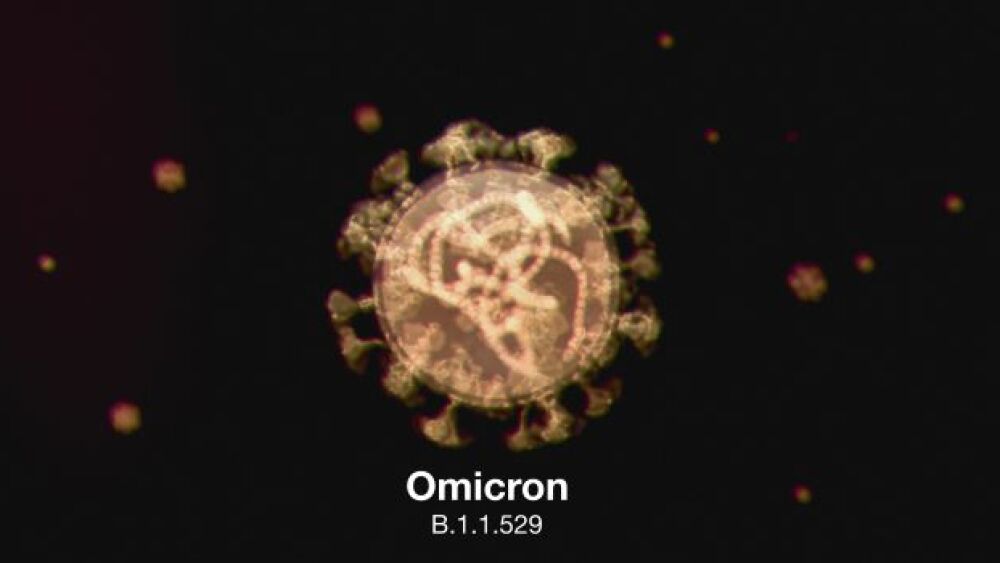Pfizer and BioNTech reported laboratory assays indicating that three doses of their mRNA COVID-19 vaccine are effective against the new COVID-19 variant, Omicron.
Yesterday, Pfizer and BioNTech reported laboratory assays indicating that three doses of their mRNA COVID-19 vaccine are effective against the new COVID-19 variant, Omicron. In the preliminary data, they found that the efficacy of the antibody response in plasma from people with two doses of the vaccine dropped 25-fold, but a third booster shot increased it 25-fold, back to levels seen after the second shot regimen.
Albert Bourla, chief executive officer of Pfizer, projects that a fourth dose might be necessary a year after the third shot. Or, potentially, a booster that specifically targets Omicron might be necessary. He told CNBC’s “Squawk Box” that the timeline for a fourth shot might have to be moved up. Either way, it supports arguments that yearly shots, similar to influenza shots, are likely to be needed against COVID-19. Bourla said a booster may be needed every six months if they don’t modify the vaccines for new variants.
Currently, the U.S. has only reported about 40 cases of the Omicron variant. Almost all people had mild symptoms. The World Health Organization (WHO) indicated Omicron has been observed in 57 countries. The WHO also said preliminary data suggest Omicron spreads rapidly but results in milder cases than the Delta variant. However, that is not confirmed yet.
Rochelle Walensky, M.D., director of the U.S. Centers for Disease Control and Prevention (CDC), said that in almost all of the Omicron cases seen so far, “the disease is mild.” Symptoms have primarily been cough, congestion, and fatigue. In the U.S., to date, there has been one hospitalization but no deaths.
That also appears to be the case in other countries. Still, Dr. Maria Van Kerkhove, technical lead for COVID-19 at the WHO, said it is too early to determine the severity of Omicron because almost everything they know so far is “anecdotal information.” She went on to say, “We certainly have information from South Africa that many of the patients that are identified with Omicron have a more mild course of disease. But it does take time for people to go through the full course of their infection.”
Sam Fazeli, Bloomberg Intelligence pharmaceuticals industry analyst, wrote in a research report, “The critical question, which applies equally to the Delta variant, is how long these high antibody levels last and what they mean for protection against infection and disease. Given the 25x reduction in neutralization of Omicron in those vaccinated with just two doses, adding to data from two other labs that show a 40x decline, we expect protection against infection to be lost.”
Much of the discussion of vaccine efficacy against variants revolves around antibody responses. However, another immune system component, T cells, plays a vital role, particularly in long-term immunity. However, T-cell levels are more challenging to evaluate. Pfizer and BioNTech have indicated that although the spike protein in SARS-CoV-2 has about 37 mutations in Omicron, about 80% of the virus recognized by T cells haven’t changed.
Vaccine makers, not just Pfizer and BioNTech, are scrambling to test their vaccines against the variants, including Omicron, and determine how quickly they can modify their vaccine formulations to adjust, if necessary. The general timeframe mentioned for the mRNA vaccines, such as Moderna and Pfizer-BioNTech, is about 90 days. Pfizer indicates it would have an Omicron-specific vaccine candidate ready for the U.S. Food and Drug Administration (FDA) in March 2022. Moderna projects 60 to 90 days.
E. John Wherry, Ph.D., an immunologist at the University of Pennsylvania, says that Omicron “is pulling the fire alarm. Whether it turns out to be a false alarm, it would be really good to know if we can actually do this—get a new vaccine rolled out and be ready.”
The question of whether or not a modified vaccine is needed still hasn’t been answered. Although there appears to be a drop in efficacy against the Omicron variant, it’s unclear whether the decrease is significant enough to require a booster that directly targets Omicron—or any future variants that might arise.
“This is not trivial,” said Ugur Sahin, BioNTech’s chief executive officer, before Omicron’s discovery. He said that a company might apply to market a new formula, “but what happens if another company makes another proposal with another variant? We don’t have an agreed strategy.”
And why didn’t companies retool to address the Delta variant, which was dramatically more infectious than previous variants? Largely because the vaccines were still at least as effective as the FDA’s original efficacy bar set for approval at 50% and because boosters appeared to take care of the drop in antibody response.
And the regulatory framework for modified vaccines isn’t clear. The FDA has suggested that full-blown clinical trials of modified versions wouldn’t be necessary, but smaller studies would be likely to compare immune responses to the original regimens.
And not all public health experts think that booster shots are the appropriate response to Omicron. Dr. Soumya Swaminathan, the WHO’s chief scientist, said, “Wholesale boosting is not the solution right now.” She was probably referring to Europe and the U.S. The WHO and other groups have pointed out that there are countries and regions that are struggling to get their populations dosed with a first shot, let alone a third or fourth.
Swaminathan added, “The data from country after country after country is showing that the people who are in the ICUs, the people who are severely ill, and the people who are dying are the unvaccinated. I think the message is loud and clear that it’s a primary course of vaccination that is going to protect against severe disease and death—and that has to be our goal.”





